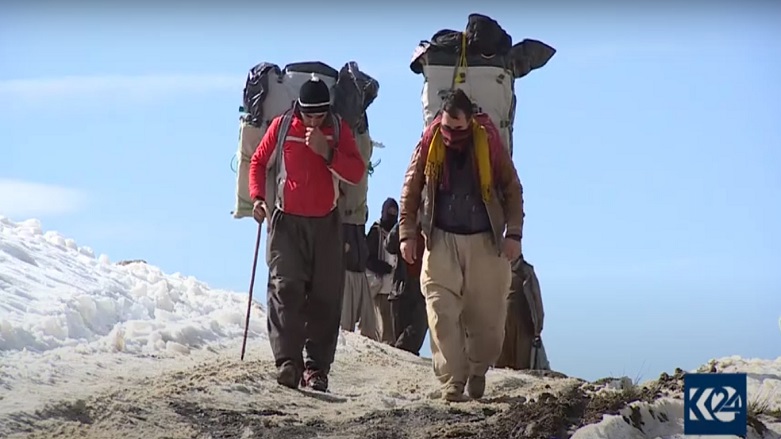Kurdish border courier dies near his hometown of Sardasht

ERBIL (Kurdistan 24) – Azad Ismailpour, a Kurdish border courier, died while transporting goods on a mountain pass near his Iranian Kurdish hometown of Sardasht.
“According to the report received by Hengaw Human Rights Organization, 37-year-old Kolbar Azad Ismailpour from Sardasht fell down a rocky cliff in the mountainous border region near his hometown on February 14, 2022,” the Iranian Kurdish human rights organization Hengaw reported on Wednesday.
Kolbar is the Kurdish term for individuals who smuggle small amounts of goods across the border (“kol” meaning “back” and “bar” meaning “carrying”).
Ismailpour came from the village of Kolsa in Sardasht. He leaves behind a wife and two children.
According to data from Hengaw, at least 52 Kolbars lost their lives in 2021, and 163 Kolbars were injured due to the dangers associated with their work.
Read More: Iranian border guards kill, injure 3 couriers near Kurdistan border
With no other means to earn a living, Kurdish Kolbars climb near-impassable roads daily while carrying goods such as tobacco, clothes, and tea to make as little as $10 a day.
Though illegal, it is a local practice that has long since been accepted as normal in the economically undeveloped areas in Iranian Kurdistan (Rojhilat), where many residents depend on it for their livelihoods.
Read More: PHOTOS: The harrowing trek of the Kurdish Kulbar
Due to the nature of their practice, Kolbar have often been the target of Iranian border guards who accuse them of trespassing.
Iranian laws dictate that border guards can only fire their weapons if they believe the trespasser is armed and dangerous.
The security personnel must also observe the following procedures:
1. Give an oral warning.
2. Fire into the air.
3. If they must open fire, target the lower body.
Despite these procedures, border guards regularly shoot Kolbars.
